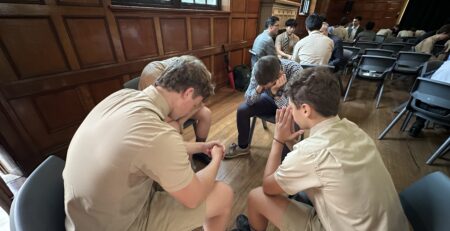From the Deputy Head Master – Summer Hill
Whoever loves discipline loves knowledge, but he who hates correction is foolish.
Proverbs 12:1
The focus of this term’s Life Skills programme is growth, and your sons have heard about the importance and value of having a growth mindset, and that determination, stamina, and perseverance are high-value personal attributes. At Trinity, we hold tightly the belief that all students can grow; intellectually, spiritually, and physically, the triune concept of growing in Mind, Body and Spirit that is the foundation of our ethos. At this week’s Middle School Assembly, Mr Neil Van Heerden, the Housemaster-Middle School of School House, made some pithy observations about the value of developing grit, a concept that is worth reflecting on, especially as we consider the reported concerns for young people’s wellbeing following a couple of very stressful years. A precis of his remarks follows and may be an opportunity for some dinner table conversation.
As a tangential aside, Trinity is committed to helping you help your sons become resilient, and so I was slightly discombobulated when Dr Michael Carr-Gregg, the well-known and highly reputable adolescent psychologist, declared in the media a week or so ago that, “Post-pandemic, we’ve got the worst mental health scenario (he had) seen in 25 years”, an observation that reflects a trope that has come to characterise the media (and social media) echo chamber for the last 18 months or so. It was not so much the observation about the wellbeing of young people, which may well be true, but that there was no nuanced acknowledgement of the role of coping with hardship, challenge, disappointment, anxiousness, and stress play in helping young people develop resilience. For that reason, I have included some remarks he made pre-pandemic that may provide some of the nuance missing in the current public discourse.
Pre-pandemic, Dr Carr-Gregg expressed an opinion that today’s young people are not as resilient as previous generations, and that as parents and educators we had to remember that failure (disappointment, hardship, stress and so on) is often how we learn, that wrapping our children and young people in cotton wool in an attempt to protect them from the vicissitudes of life may, in fact, have the opposite effect. When to intervene if we perceive young people are at risk, when unhappiness or anxiousness tips over and becomes a mental illness, who we can talk to and how we raise awareness of the very real risks of mental illness without creating a legion of ‘worried well’, are important questions to consider in the raising and education of young people, and we do well to consider his observations.
But I digress …
Good afternoon. I have only one message for you today. It is what we in the English Faculty call an imperative, a call to action.
‘Get Gritty, Stay Gritty’.
In these brief remarks, I’m going to unpack three basic questions that speak to the term ‘grit’.
First, what is grit? Second, how do we measure ‘grit’? and third, how can we ‘get gritty’ and ‘stay gritty’ in our pursuit of academic growth?
So, what is ‘grit’? It’s a term coined by psychologist, Dr Angela Duckworth, and comes from her book, ‘Grit’. It is the intersection of passion and resilience – what you are interested in, fused with a high degree of stamina and motivation to pursue those interests. In her book, Dr Duckworth argues that our culture still believes that your IQ – your fixed natural intelligence – is the best predictor of academic performance and success.
Her thesis is that’s wrong. Instead, she argues that across different environments – in the military, in schools and universities, on the sporting field, in the creative arts, in the corporate world – ‘grit’ is the single most dependable predicator for performance and success. She argues that ‘grit’ is not a fixed quality for an elite few, like a high IQ, but a learnable quality that grows in those who are willing to nurture this quality by showing up, stepping into, meeting, and rising above a challenge. It is the bedrock of the growth mindset model.
Dr Duckworth argues that those who are ‘very gritty’, tend not to utter statements like, ‘I’m bored; This isn’t worth the effort; I can’t do this; This isn’t important to me; I might as well give up.’
‘Gritty’ students tend not to be passive participants waiting to be ‘spoon-fed’ content and understanding, but rather, those who are actively and persistently seeking something interesting in each learning moment, particularly in moments where there doesn’t seem to be anything interesting yet. So how is it measured and identified? At Trinity, ‘grit’ is best measured through your EPA, and that it is quantifiably the case that for those who achieve EPA of 4.0 or above almost always see growth in their GPA. But let’s leave those statistics for a second and consider how you measure your own ‘grittiness’ and its growth in real-time.
When you adopt a growth mindset about your learning, you commit to the belief that you have real power over your capacity to learn. You have a purpose that spurs you on. That is how you ‘get gritty’.
But of course, there are often things beyond our control that make ‘staying gritty’ in your academic growth a very real challenge. It is very hard to suddenly engage in a subject with which you are unfamiliar. It is hard to move past those insecurities we have as learners. And it can take months for that engagement and those risks to pay off. So, in answering the question of how we ‘stay gritty’, we need to identify the practices over which we have the most control.
Firstly, we need to find avenues of interest. Too often, we can make the mistake of limiting our interests and closing off new possible passions in learning. Those who are gritty tend to find points of interest in any circumstance.
Secondly, we can misunderstand the value in planning before stepping into a challenge. To forgo planning is to make a habit of cutting corners and is catastrophic for those seeking growth in their learning. It is the equivalent of Ollie Hoare choosing not to pack his shoes for the Olympics. Ill-advised, unwise.
Thirdly, we can get bogged down by ‘failure fatigue’ – the dissatisfaction that comes from regularly engaging a little before failing significantly, leading eventually to the fulfilment of this mantra, ‘I tried before. I failed before. No more.’ But this logic completely dismisses two essential questions: ‘How much or how little was I trying this time? Was I even interested in really trying in the first place?’
Finally, we can anaesthetise and numb our engagement through small acts of focus-draining distraction. In research about how screens are reshaping how we think, act, feel – the overwhelming evidence at present suggests that we live in a digital culture that distracts us with an inundation of noise, colour, movement, apps, videos, games, and stimuli. In recent studies from institutions like Harvard, Princeton and York, researchers found that not only did those who habitually multi-task perform worse in their assessments, but that those who sat around those kinds of learners, did too. Why? Because being distracted drains you. It drains your focus and your energy. And when you are a drained, distracted learner, you may be doing more schoolwork at home than you are at school. You may feel like you are really trying by staying up late to complete work, or by sacrificing class time to complete an assessment for another. But this is cutting corners and a guaranteed pathway to ‘failure fatigue.’ I wonder how many of you are struggling to maintain such a routine. I can tell you that that is not a routine that encourages growth or curiosity or passion or resilience. That is not how you ‘get gritty’ and ‘stay gritty’.
Instead, you need to find avenues of interest. Be open. Set goals that are long-term and concrete. Plan. Set routines. Make connections with people who you trust, and who are more experienced and ‘gritty’ than you. Avoid those distractions that drag you away from growth. Repeat this cycle of thinking and, as you do, consciously speak into yourself, ‘I’m here to get gritty and stay gritty’.
This is what we aspire to as community of learners. We’re all here to help. It is our raison d’etre. We believe you can do it. So, ask yourself: how will you show up for, step into, and get ‘gritty’ with your learning this term?
Bradley Barr | Deputy Head Master – Summer Hill
















